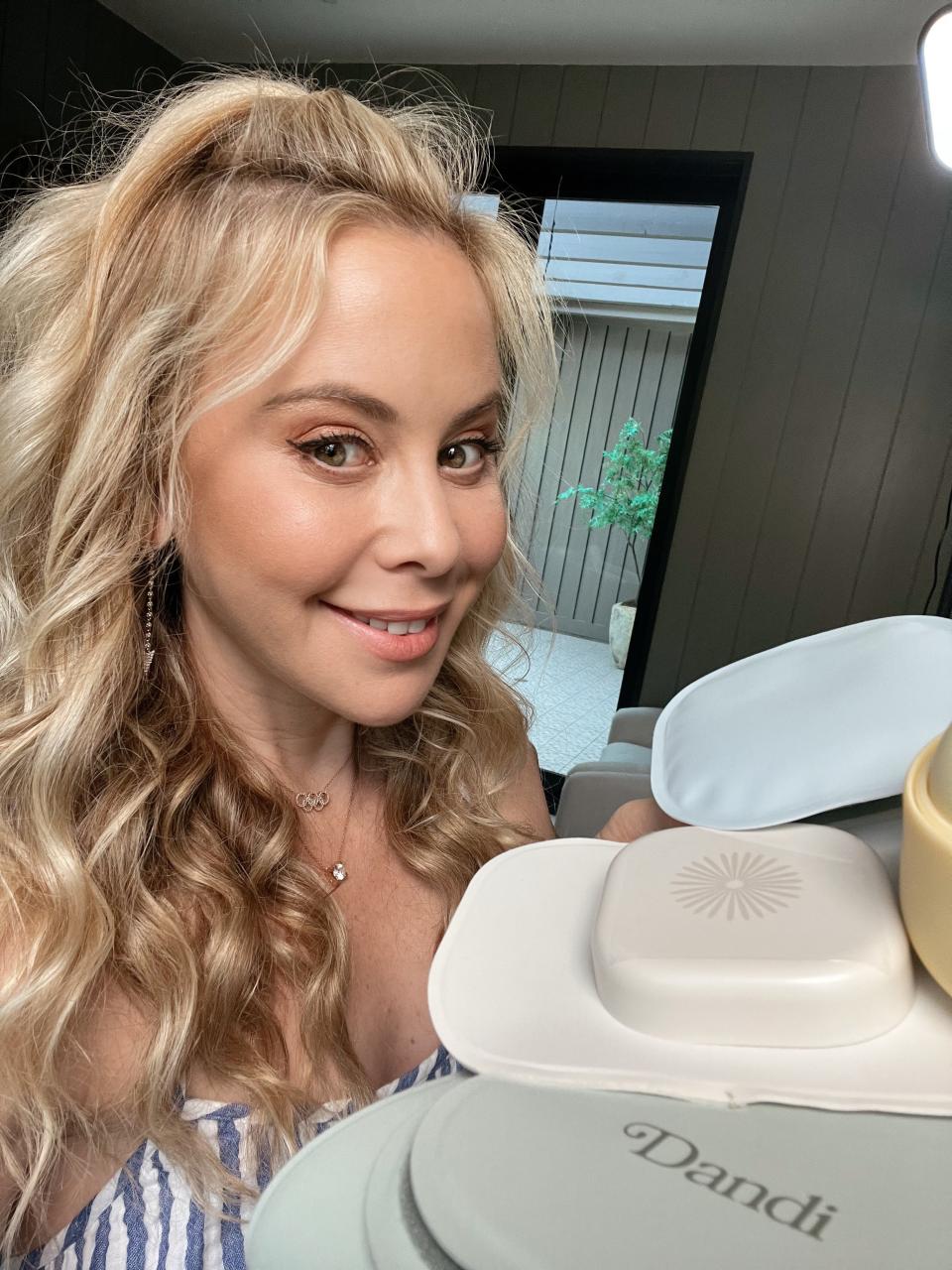Olympic champion Tara Lipinski talks infertility journey: 'Something that I carry with me'
You've watched Tara Lipinski take many a leap as an Olympic ice skating champion. But you didn't watch her stumble behind the scenes through four miscarriages, six failed in-vitro fertilization transfers and eight egg retrievals.
Lipinski, 42, documented her infertility journey on her podcast, "Unexpecting," and she and husband Todd Kapostasy later welcomed 9-month-old daughter Georgie through surrogacy. Now she's joining fertility brand and IVF care kit maker Dandi as its equity partner and head of community to help others through it, too.
The experience "changed me forever as a person," Lipinski says over a recent reflective Zoom call from Los Angeles, recounting her traumatic five-year endeavor toward motherhood. But with that trauma came community. Camaraderie. Connection.
"It was so meaningful for me to connect with people going through a similar journey, or had been on a journey like that in the past, and just opening up my Instagram to a DM of someone sharing a vulnerable moment," she says, excited to talk with people on Dandi's private group on WhatsApp. "I don't know them. They're not friends or family, but I immediately felt this connection and bond to them because of the shared experience."

Tara Lipinski on 'biggest regret' of infertility journey
Lipinski chatted ahead of the Paris Olympics, where she'll once again be broadcasting – but this time with Georgie happily in tow. It's a "surreal feeling and moment to realize that she's here with us and that I get to experience being a mom and watch her grow up."
It makes sense it was "surreal," given the unwieldy, winding road to get there. "You just keep doing the same thing, getting the same result that we searched more, and that was where, to put it in layman's terms, the genetics between me and my husband, my immune system would reject the pregnancy," she says. Ultimately, she grew tired of it all not working and decided to go the surrogacy route: "You get to the point where my biggest regret at the end of the five-year journey was, why did I wait so long?"
She learned patience as an athlete. You work hard and you'll succeed. "That doesn't always happen with a medical diagnosis," she says.
Over the years, Lipinski thought motherhood just wouldn't be in the cards. Now: "Sometimes I just feel like I'm almost walking through a dream. whereas Is it really happening to me? Am I going to wake up from this?"
Essay: I 'survived' infertility. But not before it shaped my perspective on everything.
On normalizing infertility
Lipinski wishes she had a community of people to talk to while struggling with infertility, something 1 in 5 women will experience – hence her support and enthusiasm for the brand – despite the experience being inherently isolating.
"You also may need that time before you really share with people around you, but you still need resources, and there was just such a lack of resources where really women and couples and people going through infertility or pregnancy loss – it's just Google, or it's searching a hashtag on Instagram to try to find someone that you connect with, or can relate to," she says. People can turn to the Dandi group to ask each other and medical professionals any and all questions – which is everything, given how much rides on each cycle.
The more people talk about it, the more it "starts to normalize infertility, and it starts to hopefully make people feel less alone," she adds.
Part of that normalization began right at home with her husband. "There were learning curves of how he deals with emotions surrounding IVF or pregnancy loss, or how I approach that, and I think it took us awhile to really be able to understand how we processed grief or loss or failure or fear," she says. Like any tough subject in a relationship, vulnerability remains key.
Infertility and grief
For those looking to support someone in their life going through infertility, remember "they're experiencing a lot of loss, they're experiencing failure," Lipinski says. "It is just grief. So even though it's infertility, it's a medical diagnosis, sometimes advice isn't always the most helpful. Sometimes it's just the question of, 'How can I show up and be there for you?'"
The loss, of course, doesn't disappear. Just because Lipinski has Georgie doesn't mean her grief vanished.
"It's something that I carry with me and that I've learned to cope with and deal with," she says. "We're approaching a second surrogacy journey now, hopefully to build our family more. And a lot of these moments are reminders or triggers from the past."
But her heart and mind expanded during the process, too. "I'm just thinking, 'what could somebody be going through in life,' whether it's infertility or a medical diagnosis, or grief or loss?"
She isn't "a real 'meant to be' person. But I do think that the journey, the silver lining there was just the gratitude that I feel. Obviously, every parent feels gratitude, but it really is an overwhelming feeling almost constantly when I'm around her, of gratitude, which really lets me be present."
And that's not too tricky of a leap to make.
If you'd like to share your thoughts on grief with USA TODAY for possible use in a future story, please take this survey here.
This article originally appeared on USA TODAY: Tara Lipinski on infertility journey, IVF, surrogacy, Paris Olympics


